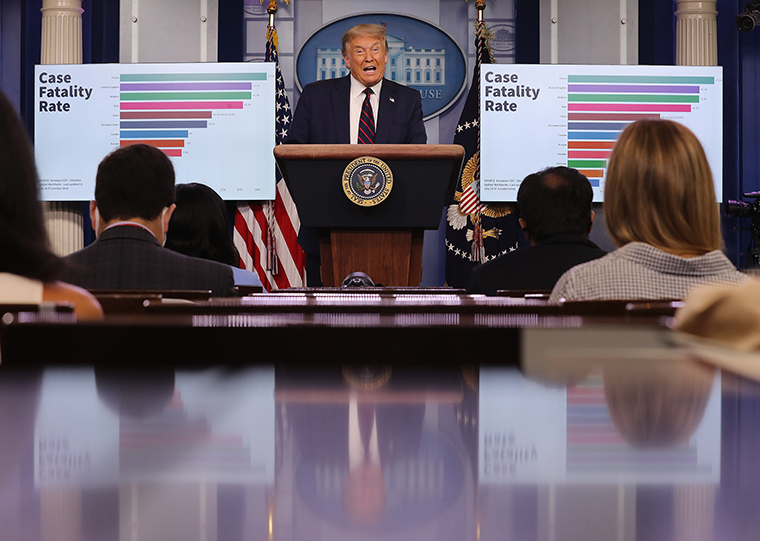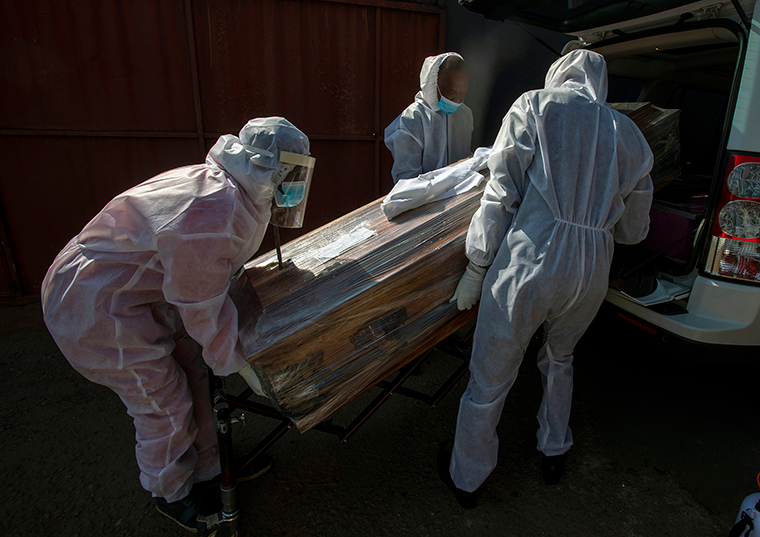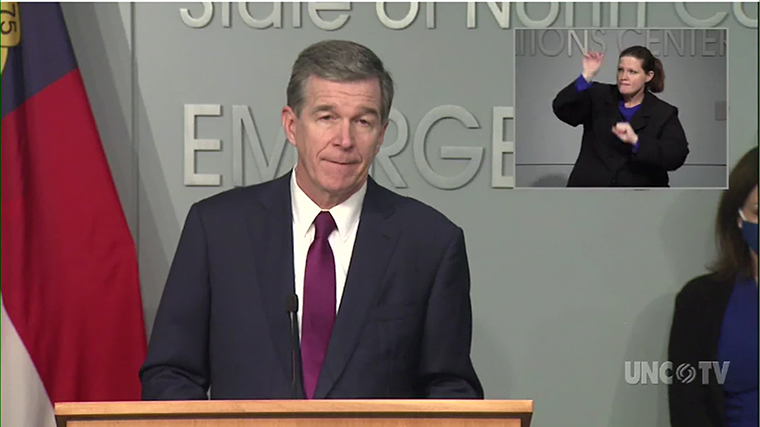Trump says coronavirus pandemic will probably "get worse before it gets better"
From CNN's Nikki Carvajal
 Chip Somodevilla/Getty Images
Chip Somodevilla/Getty ImagesThe pandemic in the US will probably get worse before it gets better, President Trump said in opening comments at a press briefing Tuesday.
“You look all over the world, it’s all over the world,” Trump said, despite the fact that many countries have seen their Covid case numbers drop dramatically.
The President has consistently had an optimistic tone over the course of the pandemic, often repeating that the virus will “go away.”
Trump says masks are effective, but he isn't wearing one himself
From CNN's Kevin Liptak
President Trump issued his strongest encouragement to date to wear masks, saying they are effective in containing the spread of coronavirus, yet wasn't wearing one himself.
After months of downplaying their importance and insisting they are only a recommendation, Trump said Tuesday that masks should be worn when people are unable to spread out.
"We are asking everybody, when you are not able to socially distance, wear a mask," Trump said.
He went on: "Whether you like the mask or not, they have an impact."
Trump was not wearing a mask during his appearance in the White House briefing room.
Asked later about whether he's providing an example to Americans on mask-wearing, Trump said he was — and pulled out his navy blue mask from his pocket to demonstrate his readiness to cover his face.
"I carry it, I wear it," Trump said, saying when he's in an elevator with security personnel, he will wear a mask to protect them.
"I'm getting used to the mask. Think about patriotism. Maybe it helps. It helps," Trump said, stopping short of actually putting the mask on.
Kentucky to allow unlimited Covid-related emergency days for school staff
From CNN’s Rebekah Riess
Kentucky Lt. Gov. Jacqueline Coleman today announced several measures taken by the state to provide increased flexibility for school districts as they reopen for in-person instruction for the 2020-2021 school year.
Kentucky will now allow for unlimited NTI days, or non-traditional instruction days, in order for schools to be able to decide to move to full-digital instruction without any limitations, Coleman said.
The state has also removed its "Daily Average Attendance" requirement for school district funding, which will allow schools to create hybrid models where they may bring some students on some days and some students on others day, creating flexibility, according to Coleman.
Coleman also announced the Expanded Care Program that will help provide funding for school districts with a three-to-one federal match for things like mental and behavioral health services.
Kentucky will provide school districts with unlimited Covid-related emergency days for faculty and staff that must quarantine because they have been exposed to the virus.
“So they're not using sick days unless they are actually sick, but because they are coming to work and working with a huge number of students and families, that if they were forced to quarantine for safety reasons, that our districts now can extend these emergency days for Covid-related issues," she added.
Texas reports more than 9,000 new Covid-19 cases
From CNN's Raja Razek
Texas reported at least 9,305 new Covid-19 cases on Tuesday, bringing the total to approximately 341,739 cases.
The state also reported at least 131 new Covid-19-related fatalities, bringing the total number of deaths to approximately 4,151 in Texas.
Note: These numbers were released by the Texas Health and Human Services, and may not line up exactly in real time with CNN’s database drawn from Johns Hopkins University and the Covid Tracking Project.
More than 5,300 people have died from Covid-19 in South Africa
From CNN's Nada Bashir
 Funeral home workers in protective suits carry the coffin of a woman who died from COVID-19 into a hearse in Katlehong, South Africa, Tuesday, July 21. Themba Hadebe/AP
Funeral home workers in protective suits carry the coffin of a woman who died from COVID-19 into a hearse in Katlehong, South Africa, Tuesday, July 21. Themba Hadebe/APAt least 195 new coronavirus-related deaths across South Africa have been recorded, the National Institute for Communicable Diseases (NICD) confirmed Tuesday – bringing the total death toll to approximately 5,368.
According to the latest data from the NICD, a total of at least 381,798 cases of coronavirus have been confirmed across South Africa, including approximately 8,170 new cases recorded over the last 24 hours.
Some background: On Monday, officials from the World Health Organization said they are concerned that the country’s rising numbers could signal greater Covid-19 spread throughout Africa, with cases increasing by about 30% in South Africa alone over the last week.
“While South Africa is experiencing a very, very severe event, I think it is really a marker of what the continent could face, if urgent action is not taken to provide further support,” Dr. Mike Ryan, director of the WHO’s Health Emergencies Program, said Monday during a media briefing in Geneva.
“I'm very concerned right now that we're beginning to see an acceleration of disease in Africa,” he added.
Study indicates immunity wanes quickly in people with mild Covid-19 infections
From CNN’s Maggie Fox
There’s more evidence that people start to lose any immunity to the novel coronavirus within a few weeks after they have been infected — especially if they have mild symptoms or no symptoms.
A team at the University of California Los Angeles did an in-depth study of 34 people who had recovered from mild coronavirus infections. They tested their blood two or three times over three months.
They found a rapid drop in antibodies – the immune system proteins that help stop viruses from infecting cells in the body. On average, the antibody levels fell by half every 73 days, Dr. Otto Yang of UCLA’s Geffen School of Medicine and colleagues reported in The New England Journal of Medicine.
A survey of people in Spain released earlier this month found similar results.
“Our findings raise concern that humoral immunity against SARS-CoV-2 may not be long lasting in persons with mild illness, who compose the majority of persons with Covid-19,” Yang and colleagues wrote.
It’s still not known if people can be infected more than once with the novel coronavirus. But there are other, related coronaviruses that cause common colds, and people can and do catch those repeatedly.
“A crucial question is the extent to which these mildly infected individuals contribute to onward transmission. Another one, is whether or not a mildly infected individual, if infected again, is any more or less likely than average to develop a severe infection the second time around,” said Rowland Kao, an epidemiologist at the University of Edinburgh in the UK who was not involved in the study.
North Carolina governor calls for extension of $600 a week federal benefit for unemployed workers
From CNN’s Eileen McMenamin
 UNC TV
UNC TVNorth Carolina Gov. Roy Cooper today called on Congress to extend the Federal Pandemic Unemployment Compensation program, which gives an additional $600 a week to workers receiving unemployment benefits due to Covid-19.
Currently the federal funding is due to expire at the end of this month, with members of Congress weighing a path forward on another economic stimulus package.
The governor also announced North Carolina is delivering “over 900,000 masks and other supplies to farm workers” across the state. “We must keep food in our grocery stores and on our tables. To do that, we must help protect the farmers and their families from this virus," Cooper said.
What the numbers look like: North Carolina's secretary of health and human services, Dr. Mandy Cohen, said the state now has 102,861 confirmed cases of coronavirus. The state, Cohen said, set a record over the weekend for highest number of new cases reported in a single day.
Massachusetts governor extends moratorium on evictions through October 17
From CNN’s Rebekah Riess
Massachusetts Gov. Charlie Baker today extended the state’s pause on evictions and foreclosures through October 17.
The moratorium was set to expire on August 18, according to a statement from the governor’s office.
The extension provides Massachusetts residents with “continued housing security as businesses cautiously re-open, more people return to work, and the state collectively moves toward a ‘new normal,’” the statement said.
According to the statement, tenants are strongly encouraged to continue paying rent, and homeowners to make their mortgage payments, as much as they are able.
Baker said his administration will consult with court administrators and other stakeholders during the new 60 day extension about programs and policies to help tenants avoid eviction when proceedings resume.
Covid-19 transmission levels in California have made contact tracing "impractical," official says
From CNN's Cheri Mossburg
High levels of transmission of coronavirus have made traditional tracing “impractical and difficult to do,” California Health Secretary Mark Ghaly said in streamed update on the virus.
The state is working to refine strategies and continue to work with counties to build up the so-called "tracing army," but Ghaly warns that “even a very robust contact tracing program will have a hard time reaching out to every single case.”
Ghaly said the data is continuing to stabilize and as that happens, he expects to see transmission rates to come down and contact tracing to go up.
Addressing the rise in cases, which have passed 400,000 confirmed to date, Ghaly said that California has been able to avoid a large spike that other states and nations saw early.
“As a result, we’ve been able to limit not just the number of those with the worst outcomes, but even improve the clinical outcomes of those who’ve been hospitalized altogether,” Ghaly said, adding that the state has used the time to build up an inventory of supplies and hospital capacity.

 5 years ago
550
5 years ago
550 

